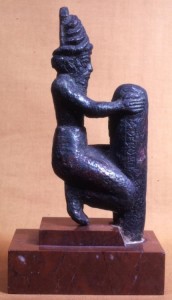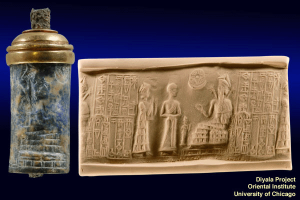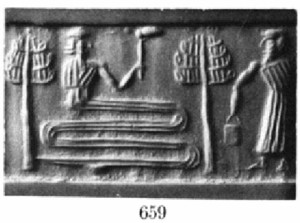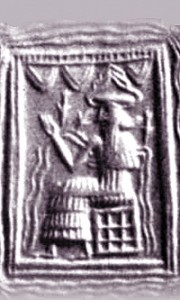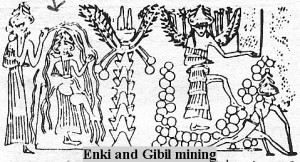Ningishzidda / Ninjeczida = Enki‘s & Ningiridas‘ son
Azimua spouse to Ningishzidda
(Texts: All Artifacts, Color Coding, & Writings in Bold Type With Italics Inside Parenthesis, are Added by Editor R. Brown, not the Authors, Translators, or Publishers!)
(gods in blue …mixed-breed demigods in teal…)
As Ningishzidda:
“When thou comest up to heaven, and approachest the door of Anu,
Tammuz (Dumuzi) and Gishzida (Ningishzidda)
at the door of Anu are standing (visiting Anu on Nibiru / Heaven). …”
“Let Azimua marry Ningishzidda; …”
“The god Nin-gish-zida (Enki‘s son) is the god of Gudea, the patesi of Shirpurla,
who the temple E-anna (Anu‘s temple in Uruk) has constructed …”
“ Gudea…whose primacy has been firmly founded by the god Nin-gish-zida (Enki‘s son) his god. …”
As Ninjiczida:
“Ninjiczida, who brings together giant snakes and dragons!
Great wild bull who, in the murderous battle, is a flood that ……!
Beloved by his mother, he to whom Ningirida gave birth
from her luxurious body, who drank the good milk at her holy breast,
who sucked in lion’s spittle, who grew up in the abzu!…”
“Azimua shall marry Ninjiczida (Ningishzidda) …”
“In Jicbanda, the house that was filled with lamentation, lamentation reeds grew.
Ninjiczida took an unfamiliar path away from Jicbanda.
Azimua (Ningishzidda‘s spouse), the queen of the city, wept bitter tears.
‘Alas, the destroyed city, my destroyed house,’ she cried bitterly. …”
“Let Gilgamec as a ghost, below among the dead,
be the governor of the nether world.
Let him be pre-eminent among the ghosts,
so that he will pass judgments and render verdicts,
and what he says will be as weighty as the words of Ninjiczida and Dumuzid …”
“The king of ……, Ninjiczida (Ningishzidda) .…..,
and he walks along the road together with Culgi (King Shulgi),
the good shepherd of Sumer …”
(Gudea speaking:)
“As he …… and walked proudly,
Lugal-kur-dub walked in front of him,
Ig-alim directed him and Nin-jiczida (Ningishzidda),
his personal god, held him by the hand throughout the time. …”
“The house has been built most sumptuously by its lord.
It was built on a pedestal by Ningiczida.
Its foundation pegs were driven in by Gudea, the ruler of Lagac (Lagash). …”
“To the valiant warrior Ninjiczida (Ningishzidda), in his palace,
the shepherd Ur-Namma offered a chariot with …… wheels sparkling
with gold, …… donkeys, thoroughbreds, ……
donkeys with dappled thighs, ……, followed …… by a shepherd and a herdsman …”
“To his (Ningishzidda‘s) spouse, Ninazimua (Azimua),
the august scribe, denizen of Arali, in her palace,
the shepherd Ur-Namma offered a headdress
with the august ear-pieces (?) (alien technologies)
of a sage, made of alabaster, a …… stylus, the hallmark of the scribe,
a surveyor’s gleaming line, and the measuring rod ……. …”
Kulla = Ningishzidda, son to Enki
Master Builder / Architect
(Assyrian King Esarhaddon Speaking:)
“[At that] time, Ekur (“House, Mountain”), the temple (residence) of the god En[li]l, lord of the lands, my lord,
which a previous king had [built], became [ol]d and [its] walls [buckl]ed.
[I sou]ght [its (original) emplacement], removed its dilapidated parts, (and) surveyed its (entire) foundation.
I [completely] (re)bu[ilt (it)] with the work of the god Kulla (Ningishzidda)
according to [its ancien]t spe[cifications (and) raised its top (as high) as a mountain.]”
“At that time Ebaradurgara, the temple of the goddess Queen-of-Nippur (Ninlil), the great lady, my lady,
which a previous king had built, became old and its walls buckled.
I sought its (original) emplacement, removed its dilapidated parts, (and) surveyed its (entire) foundation.
I completely (re)built (it) with the work of the god Kulla (Ningishzidda) according to its ancient specifications
(and) raised its top (as high) as a mountain.
“I bui[lt Etemenanki, the ziqqurat], as it was before — its length [is one ašlu
(and) one ṣup]pān, (and) its width is one ašlu (and) one ṣuppān.
I offered pure offerings to […] the great [gods] and the god Kulla (Ningishzidda), the lord of foundations (and) bricks.
I laid their foundations with […] …, wine, (and) kurunnu-wine, and I secured [their] footings.
[I had foundation inscriptions made of (…)] basalt [(and) I wro]te [on them] the glory of the great lord, my lord,
and I pl[ace]d (them) in their (Esagil’s and Etemenanki’s) midst.
[…] I restored its precious [ritu]als and [… I] established …”
“I had Babylon, (which was measured by) the aslu-cubit checked by the gods,
Imgur-Enlil, its wall, (and) Nēmed-Enlil, its outer wall,
built anew with the work of the god Kulla (Ningishzidda) and I raised (them) like mountains.
I am the one who (re)built Babylon, (re)constructed Esagil, renewed (it) gods and goddesses, …”
(Ashurbanipal, King of Assyria Speaking:)
“(With regard to) Egigunû, the ziqqurat of Nippur,
whose foundation is made secure on the breast of the Watery Abyss (apsû),
whose enclosure wall had become old and eroded,
I repaired its dilapidated section(s) with baked bricks from a (ritually) pure kiln, and completed its structure.
I had it built anew with the work of the god Kulla (Ningishzidda) and made it shine like daylight.
I raised its top (as high) as a mountain and made [its] appearance resplendent.”
“At that time, I sought the (original) emplacement of Ebabbar,
which is inside Sippar, the temple of the god Šamaš (Utu), the great lord, my lord,
which had become old, buckled, and collapsed.
I had (it) (re)built anew with the work of the god Kulla (Ningishzidda) and raised its top (as high) as a mountain.”
“At [that time, (with regard to) 1ābi-supūršu, the (city) wall of Borsippa,
which] had become [ol]d and [buckled (and) collapsed,
in order to] increase [the securi]ty of Ezida and the (other) sanctuaries of Borsippa,
[with the strength of] my [labour] forces I had [Ṭā]bi-supūršu, [its] (city) wall, built [quickly] anew
[with] the work of the god Kulla (Ningishzidda) and refitted [its gates.
I had] (new) doors made and hung (them) in its gateways.”
“At that time, (with regard to) Imgur-Enlil (“The God Enlil Showed Favor”), the (city) wall of Babylon,
(and) Nēmet-Enlil (“Bulwark of the God Enlil”), its outer wall,
which had become old and buckled (and) collapsed,
in order to increase the security of Esagil and the (other) sanctuaries of Babylon,
with the strength of my labor forces I had Nēmet-Enlil, its outer wall, built quickly anew
with the work of the god Kulla (Ningishzidda) and I refitted its gates.
I had (new) doors made and hung (them) in its gateways.“
